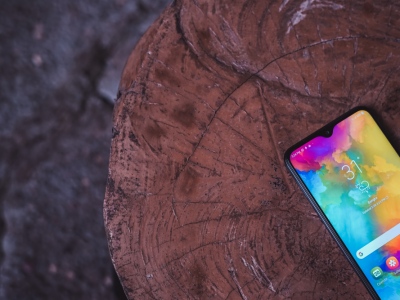 It might seem as though the smartphone race is over. Apple got it going with the iPhone, and Android ramped up the competition. Now these two entities sit atop the mobile world, and it doesn’t look like anyone will dislodge them. Microsoft has tried, but Windows Phone has yet to gain any traction. Palm did try, but the Pre line is a thing of the past. The only real competitor in the mobile space is the BlackBerry, but in the past few years it has developed a poor reputation.
It might seem as though the smartphone race is over. Apple got it going with the iPhone, and Android ramped up the competition. Now these two entities sit atop the mobile world, and it doesn’t look like anyone will dislodge them. Microsoft has tried, but Windows Phone has yet to gain any traction. Palm did try, but the Pre line is a thing of the past. The only real competitor in the mobile space is the BlackBerry, but in the past few years it has developed a poor reputation.
Yet there’s still hope for Research In Motion and the BlackBerry. Changes to the platform aren’t far off. If RIM fails, the BlackBerry will surely face a slow death. That makes the stakes for succeeding that much higher. There is a chance, then, that the BlackBerry could once again rise to glory and again play a major part in the smartphone world. Here are a few reasons that it could eventually overtake Android.
1. They’ve shown encouraging signs
Believe it or not, the latest line of BlackBerry devices represented a significant improvement for the BlackBerry line. After stagnating for years, RIM finally put together a line of solid, fast devices that can satisfy the needs of anyone who needs basic smartphone services. No, the latest line won’t compete with Android or the iPhone. But they show that RIM can indeed compete.
To hammer home this point, look at everything RIM released after the iPhone. In 2008 it tried to make a splash with its Bold line, but that was essentially the same old BlackBerry with a slightly better screen. They introduced App World, but filled it with mostly useless apps and ebooks. From 2008 through 2010 RIM continually updated the BlackBerry, but no model was particularly inspiring. It was just more of the same, and consumer weren’t having any of it.
The new devices are fast, have usable touchscreens, and generally perform at a high caliber. Business users married to the BlackBerry will find them to be useful, practical devices. These improvements suggest that RIM can and will adapt. They certainly help raise confidence in the upcoming Blackberry consumer line, running the BBX operating system.
2. The underdog effect
There is no denying that people love an underdog. Whether it’s a sports team or a product line, there are certain people who will naturally gravitate towards No. 2 — or No. 10. Right now RIM is No. 3 and falling. There is certainly a population that will embrace something that RIM releases, just because everyone else bad mouths them. (Seriously, have you ever said the word “BlackBerry” in front of an iPhone user?) RIM could gain some instant traction with this crowd.
In fact, we saw Android use this exact strategy to help jumpstart sales. In late 2009 Verizon and Motorola combined for the Droid Does marketing campaign, which pitted the new Android line against the iPhone. While the ads spoke to tasks the Droid could do that the iPhone could not, there was an underlying message to them. Droid was the upstart underdog. And many people chose Android over iPhone because of that underdog effect.
We’ve also seen it fail, as in the case of Palm. Yet Palm didn’t have the marketing power behind its Pre line that BlackBerry has behind its own. If RIM puts its marketing dollars to work in depicting the company as a scrappy underdog — changing for the sake of the customer — they could find an audience and build on that.
3. A unified platform
What is an Android smartphone? The only real unifying definition is that it runs some version of the Android OS. Yet there are many different active versions of the Android OS, and each new version has updated features. That leaves the older operating systems behind. Further, not every old device gets upgraded to the latest operating system. And that doesn’t even touch on the handsets, which can come from any number of manufacturers.
An old buzzword in the Android community is fragmentation. It referred to the troubles developers faced with multiple versions of the Android operating system. We can recycle that term to describe some current Android issues. There are just so many different things going on with Android that the common consumer might find it to be too much information. That might turn them to another platform.
The fragmentation issues are pretty clear. Some devices ship with older versions of the Android OS and are slow to get updates. Different manufacturers put out different quality devices. Manufacturers also often skin their devices, making them look different than other Android devices. While my Motorola Android might look one way, your HTC Android might look another. This doesn’t make for a very unified platform.
The BlackBerry, on the other hand, is unified. Yes, they have different versions of the operating system, but they make it clear which devices will get upgrades and which will not. Their devices are easily recognizable, as they all share similar properties. There’s no difference, for instance, between the software that runs on the T-Mobile BlackBerry Bold and the Verizon BlackBerry Bold. The devices look similar, and they run similarly. That makes the consumer’s task a little bit easier.
4. They have the experience
Never undersell experience. It can change games and it can change markets. Google has gained experience in building a mobile operating system, and they will use that experience going forward to make their product even better. But Research In Motion has been in the smartphone game for more than a decade. They gained invaluable experience by providing business users with the type of device they needed. Now they need to turn that experience to consumers.
It won’t be an easy transition, but it’s certainly one RIM can handle. It will just mean applying their experience to a different audience. No, consumers do not want the same features as business users. But RIM had to figure out what business users wanted in the first place. They can easily take that approach to consumers. On the other hand, Android’s relative lack of experience probably makes it difficult for them to resonate with business customers, even though consumer love them.
The road ahead for RIM won’t be easy. They have plenty to overcome if they want to again rise to prominence in the smartphone world. But they do have something going for them. They’ll need a few breaks, and they’ll need to do everything right. But the opportunity is there. RIM is in a position where it could overtake Android.










Comments